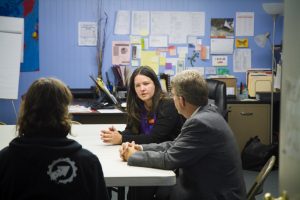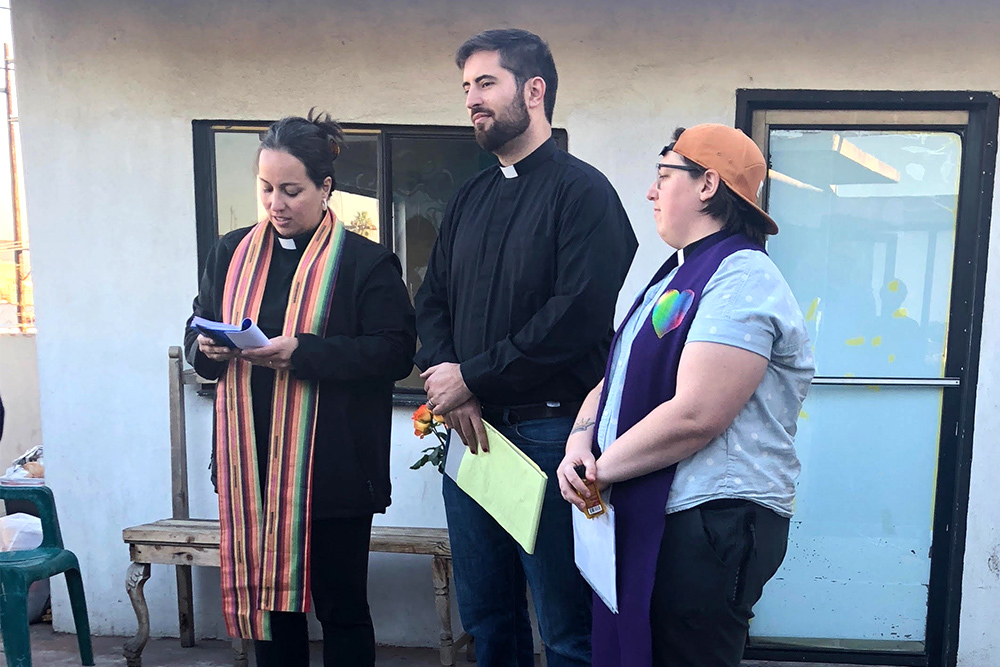Two Eastern Mennonite University alumni traveled in early December to Tijuana, Mexico, to assist people seeking asylum in the United States.
As part of a Charlottesville-based group of lawyers, law students, clergy and a clinical psychologist, Alicia Horst ‘01, MDiv ‘06 and Brittany Caine-Conley MDiv ‘14 joined efforts to provide legal and other support for people among the thousands awaiting opportunity to present themselves at the U.S.-Mexico border.
The Charlottesville group collaborated with a bi-national nonprofit that provides legal services to refugees in Tijuana.
Horst, the executive director for NewBridges Immigrant Resource Center in Harrisonburg and accredited by the U.S. Department of Justice to practice immigration law, provided legal guidance to asylum seekers. She also served as a witness at some of the 10 weddings conducted by a three-member team of clergy including Caine-Conley, who is a United Church of Christ pastor and leader of Congregate Charlottesville.
“Not only were we able to bless their unions, we were able to provide documentation that will help couples and families stay together once they present themselves for asylum,” Caine-Conley said. “The wedding ceremonies provided incredible joy in the midst of a desperate situation.”

In addition, the team of clergy accompanied a group of boys ages 15-17 to the Otay Mesa port of entry where they attempted to present themselves for asylum but instead met militarized U.S. patrols. Mexican immigration police then took away the boys, she said.
The group also observed a queue system improvised by asylum seekers: a worn notebook maintained by a committee and containing a list of names. Each day the U.S. Customs and Border Protection indicated how many people – 60 to 100 – could be called from that list for credible fear interviews, which determine eligibility for entering the asylum process.
If the asylum hopefuls were not physically present in the plaza to hear their names being called, they would miss their chance.
“By law there shouldn’t be a list like this,” Horst said. “It’s absurd.”
With 5,000 people already on the list when Horst and Caine-Conley arrived, the wait is months long. Members of the migrant caravan that had recently arrived in Tijuana were “not even close” to being called, Horst said.
“It’s a very messed-up scenario,” she said, as many of the people have fled from dangerous situations and through danger to arrive at the border only to be met with further injustice. Lacking means to meet their immediate or longer-term needs, many feel desperate – the context, Horst said, for events such as the highly publicized Nov. 26 attempt to reach a border fence in which children were among those repelled with U.S. tear gas. Tear gas was again used against migrants on New Year’s Day.
NBC-29 or CBS-19. Read more at C-Ville Weekly.
“The migrants are living in makeshift shelters or on the streets,” Caine-Conley said. “Vulnerable populations, such as unaccompanied minors and pregnant women, either cannot get on the list or don’t have the ability to wait for weeks to be called. ‘The list’ does not work and those in power wield it as a deadly tool. That’s why people have risked everything to cross the border in the midst of a militarized border patrol. These asylum-seekers are placing their best hope in the hands of the U.S. government.”
While some might question parents who subject their families to such struggles, Horst said, “you can never say what you would or would not do for your family. In general, it’s easy to judge if you come from a place of extreme advantage and privilege.”
The trip left Caine-Conley with “a complex joining of hope and hopelessness.” While she observed courage, kindness and “awe-inspiring resilience,” the situation is “dire,” she said. “I feel hopeless when I witness the fear that drives our [nation’s] immigration policies and our xenophobia.”

I thought that MCUSA and EMU had done enough damage to marriages. Now it seems they were able to completely strip marriage of all things holy. NOW marriage isn’t about unity or even commitment. It’s been reduced to a simple legal transaction in order to push another horribly flawed political agenda – illegal “immigration.” “Excuse me, is there anyone on the group who would like to join names on paper in order to ‘legally’ cross the border and live in the United States?” “Yes, you sir! Would you prefer to ‘marry’ a woman, another man, or don’t you care, as long as you are able to make it into the U.S.?” “You say it doesn’t matter to you? Right this way sir.”